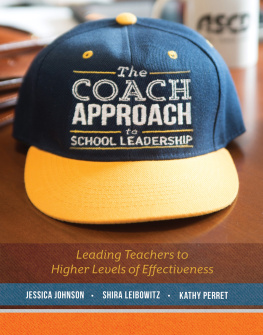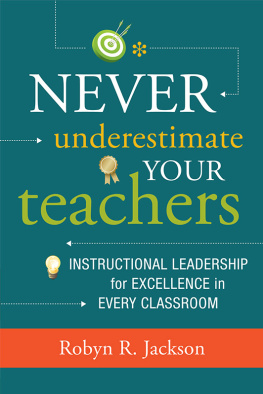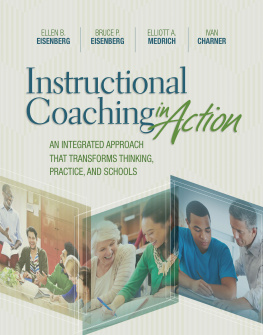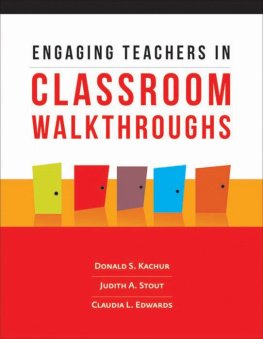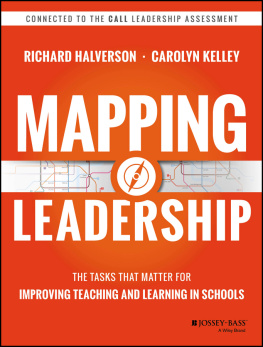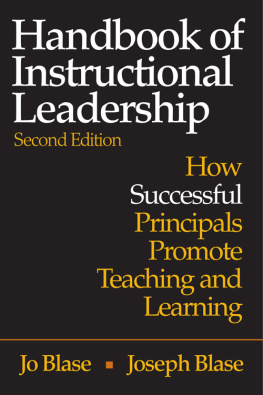Praise for The Coach Approach to School Leadership
....................
The Coach Approach to School Leadership will change the conversation about how principals can serve as instructional leaders. Providing principals with tools and strategies to "put on their coach's hat" is a much-needed step for teaching and learning in our schools. So often, principals wonder how to provide relevant support to teachers, and serving as a principal-coach is a way to do just that. The authors' breadth of knowledge around both leadership and coaching makes this book a must-read for principals.
Diane Sweeney, author of Student-Centered Coaching: The Moves
Among the most significant actions great principals do differently is getting out of the office and into classrooms to help teachers improve their skills. The authors of The Coach Approach to School Leadership present both a mindset and practical tools supporting school leaders to address the paradox of being both coach and supervisor. Through a focus on instructional coaching techniques and a deep understanding of the many challenges facing principals, this book offers extremely valuable guidance in the vital work of leading teachers to higher levels of effectiveness.
Todd Whitaker, professor, speaker, and author of What Great Principals Do Differently
The Coach Approach to School Leadership is a must-read for all administrators who have been searching for a framework to help them move beyond the traditional practices of supervision and evaluation of teachers to the roles of learner and coach. Johnson, Leibowitz, and Perret not only provide specific resources and strategies to help you build your capacity, but also challenge you to reflect on the positive impact that effective coaching techniques can have on your overall school culture. This is a book that I will keep close by and continue to refer to time and time again.
Jimmy Casas, author, speaker, and senior fellow, International Center for Leadership in Education
Dedication
....................
To the teachers, instructional coaches, and principals, to the education thought leaders and authors, and especially to our students, past and present, with whom we have been privileged to be both vulnerable and curious, discovering together the best within one another.
To our family, friends, and beloved writing buddy dogs who have offered us encouragement and laughter and kept us grounded while enabling us to grow, to learn, and to create.
And to our #educoach tribe: the participants in our weekly Twitter chat, where our collaboration began and where we continue to gain insight and inspiration.
Introduction
....................
This book is the product of a journey embarked upon by three educators separated by geography and diverse experiences, but connected by a commitment to coaching as a means of improving our own practice and the quality of teaching and learning in our schools.
The three of us "met" on Twitter during the spring of 2011 through our shared interest in how school leaders might incorporate the approaches of instructional coaches to support professional learning for teachers. We created and have co-moderated #educoach, a weekly Twitter chat, ever since, developing a friendship unlike any other we have ever experienced. Through the years, without actually meeting in person, we have communicated weekly, preparing for and participating in this chat. Beyond our chat, we have coached one another through numerous career challenges and aspirations.
Although we are all educators, our experiences are quite different. Jessica is a public school principal in rural Wisconsin. Shira is an independent school principal who has served in suburban and urban schools in the greater New York City area. Kathy is an education consultant focusing on instructional coaching, literacy, and English learners who works with educators in many different schools throughout Iowa and across the United States. We all believe in the importance of coaching and being coached as educators, learners, and leaders.
As we engaged in meaningful conversation (albeit in 140 characters or less), we recognized that the substance of our weekly Twitter chats was helping us stretch ourselves as educators and leaders. We felt a book emerging through our conversations. It is a book that has been written gradually, over the course of several years. The slow development of this book is not only the result of the busy lives we lead and our difficulty dedicating time to write, but also the result of developing ideas through global conversations with educators via social media and in conversations with educators within our own schools. We invite you to engage with us and stretch yourself as an educator, a learner, and a leader and to help those around you to stretch themselves as well.
What's in This Book?
When principals function primarily as learning leaders, the influence on the quality of learning in our schools is profound. Yet the pressure for school leaders to focus on evaluation and management rather than learning is tremendous. This book is for principals and other school or district leaders who want to lead teachers to higher levels of effectiveness and incorporate the principles of instructional coaching as a necessary part of serious school improvement.
In Chapter 1, we reframe the role of the principal, discussing the continuum of roles from judge to team captain to coach, and ultimately land on the importance of the coach role. Although a school leader could never fully play the role of an instructional coach, we delve into what it means to wear a coach's hat as a learning leader and explore how to make the shift from primarily being an evaluator, a supervisor, and a manager to being a learning leader using coaching techniques.
In Chapter 2, we show you what it looks like to put on your coach's hat by sharing what principal-coaches do each day as the learning leaders of their school. We challenge you to expand your classroom visits beyond the minimum requirements of your evaluation process and provide you with guidance to combine coaching with evaluation requirements.
In Chapter 3, we examine the most critical elements at the heart of every school: the relationships and culture. We ask you to reflect on yourself as a leader and how your staff perceive you. We dig into the partnerships that are essential to create in order to lead with a coach's hat.
In Chapter 4, we address feedback, the necessary component to support our teachers to grow professionally and improve the student learning in each classroom.
Leaders cannot effectively get into classrooms or spend time in coaching conversations with teachers if they cannot manage their time and workload effectively. For this reason, we provide you with strategies and resources that we have found to be effective for managing timeour most precious resourcein Chapter 5.
Finally, in Chapter 6, we invite you to consider ways to empower teachers to take ownership of their professional learning and support them to work together as a team.
Throughout the book, we provide a variety of vignettes from practitioners' perspectives, because so much of our growth has stemmed from learning from others' experiences and accomplishments. Teachers often say that they didn't learn what they needed to learn in their college coursework; it was actually teaching in a classroom that they learned how to teach. The same is true for school leadership. Our work is complex and challenging, and we have learned both from success and from missteps. In the process, we have been fortunate to develop a robust professional learning network (PLN) via social media and have connected with many school leaders, instructional coaches, and teachers, learning together and benefitting from one another's wisdom and firsthand experiences. The names used in this book are pseudonyms, but all of the vignettes are based on our own experiences or on stories we have heard from colleagues in our PLN. We are grateful for our colleagues' honesty and generosity in sharing their learned wisdom throughout this book.

